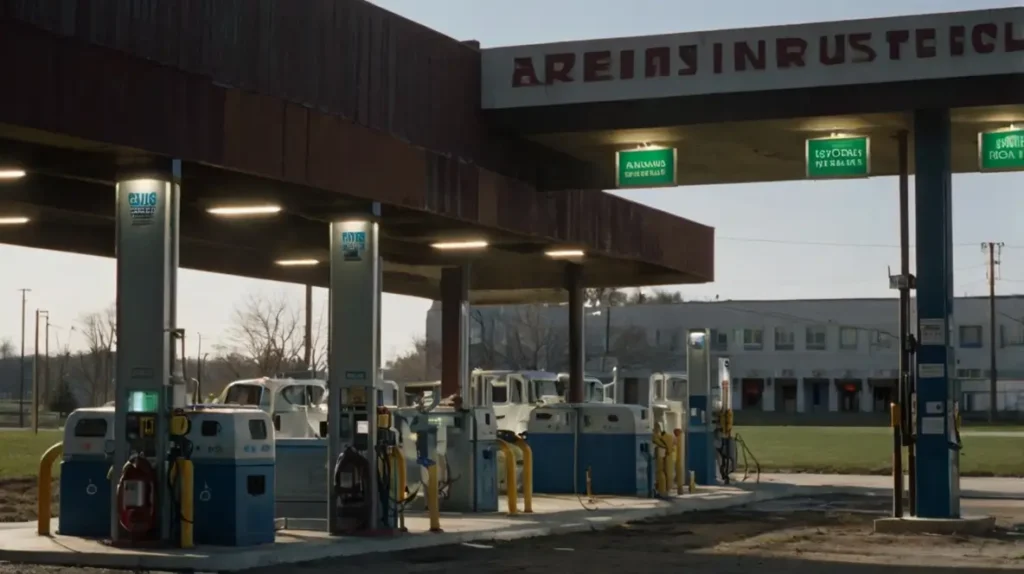Choosing the right gas can change our daily lives and the planet. Gas choices include gasoline, natural gas, propane, and even biodiesel and ethanol. Knowing these options helps us make choices that fit our values and needs. We’ll look at the different gas options, their good and bad points, and how they affect our lifestyle.
Understanding Gas Types
- Gasoline: Gasoline is the most used fuel in cars, trucks, and bikes. It’s made from crude oil and gives lots of energy. But, using gasoline harms the environment and can make prices go up.Getting gasoline can hurt the environment and cause oil spills. As we move towards cleaner energy, people are looking at other fuels.
- Natural Gas: Natural gas is seen as a cleaner choice than gasoline. It’s used in vehicles and emits less pollution. More places are getting natural gas stations, making it easier to use.Natural gas is also cheaper in many places. But, getting it can harm the environment, like water pollution. So, people must think about the pros and cons.
- Propane: Propane is made from natural gas and crude oil. It’s good for the environment and used in many ways, like heating homes. But, finding places to refuel can be hard in some areas.Propane prices can change a lot, especially when demand is high. This can affect how much you pay.
- Biodiesel: Biodiesel comes from plants and animals. It’s better for the environment and works in most diesel engines. It’s good for the planet and can help local economies.But, making biodiesel can take food away from people. It also has some emissions and can be less effective in cold weather.
- Ethanol: Ethanol is mixed with gasoline and comes from crops. It’s better for the environment. But, it can raise food prices and use a lot of land.Ethanol’s production affects food costs and land use. It’s not as efficient as thought, and its benefits are debated.
When choosing a fuel, think about several important factors: gasoline, natural gas, propane, biodiesel, ethanol, and electric options.
- Cost: Fuel prices change due to market conditions and production costs. Natural gas or biodiesel might be cheaper over time, especially with access to refueling stations. Remember, maintenance costs can vary too. For example, CNG vehicles need special care, while gasoline engines are simpler and cheaper to maintain.
- Environmental Impact: Think about the emissions each fuel type produces. Natural gas and propane are cleaner than gasoline. Biodiesel and ethanol can cut down carbon emissions a lot. Look at the emissions from production to use to understand their environmental effects.Also, consider how fuels affect local air quality. In cities, cleaner fuels can improve health. So, your fuel choice can benefit not just you but your community too.
- Availability: Where you live affects your fuel options. Gasoline is easy to find in cities, but CNG or biodiesel might be scarce. Check your area’s fueling stations to decide.Home refueling options, like propane tanks, can also be a factor. They give you control over your energy use.
- Vehicle Compatibility: Not all cars can use every fuel. Make sure your car can handle the fuel you want or get a new one. Many cars now can run on different fuels, offering flexibility.Also, think about your car’s resale value. Electric and alternative fuel cars might be more in demand soon.
- Performance: Different fuels affect how your car runs. Gasoline engines are made for gasoline, but other fuels might offer different power. Try out different cars to see what works best for you.Driving conditions also matter. For example, biodiesel might not work well in cold weather, and ethanol can affect fuel efficiency in some engines.

The Future of Gas Choices
Technology is changing how we think about fuel. Electric vehicles (EVs) are getting more popular, challenging traditional fuels. EVs lead to talks about sustainable energy and the future of driving.
Many governments are supporting EVs with subsidies and tax breaks. Better batteries mean EVs can go farther and charge faster, making them more appealing.
Hydrogen fuel cells are also on the rise. They produce electricity from hydrogen and oxygen, making them very clean. But, we need more hydrogen refueling stations.
SAFs and RNG are also making progress. SAFs cut down emissions from flying, and RNG is a renewable natural gas made from waste. These could be big changes in the energy world.
Making Informed Gas Choices
Your fuel choices affect your life and the planet. Look at all your options, weigh their pros and cons, and watch for new trends. This way, you can choose what fits your values and needs.
Learning about your fuel choices helps you understand the energy world better. It also pushes us all towards greener practices. By talking to your community and supporting clean energy, you can make a big difference.
Conclusion: Your Gas Choices Matter
Today, making smart gas choices is key to tackling environmental issues. You can choose based on cost, environmental impact, or performance. Knowing about these options helps you make choices that save money and protect the planet.
Knowing about gas choices is crucial for efficient living. With more fuel options available, you have more choices than ever. What gas choices do you make every day? Share your thoughts in the comments below! Let’s work together to make our future cleaner and greener with our fuel choices.

